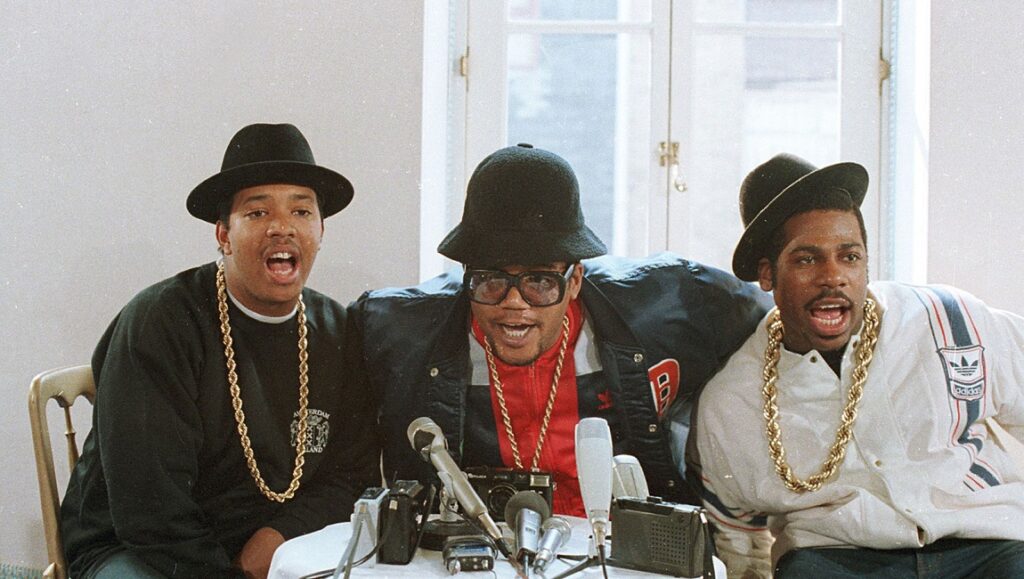To distinguish between “old-school” hip-hop of the late 1970s and the “new school,” founded primarily by Run-DMC and LL Cool J, listen to Kurtis Blow’s 1980 cut “Hard Times.” Socially-conscious lyricism is underscored by smooth-groove funk; it’s party music, replete with a minute-long bongo solo serving as the bridge. On the other hand, the first track on Run-DMC’s eponymous debut album — also called “Hard Times” — begins with a percussive synth note. It stands as a paroxysm; a call to attention. But in point of fact, this “Hard Times” is a cover of the earlier one — and Joseph “Run” and older brother/manager Russell Simmons both worked for Blow. During that time, Russell was often credited as a co-writer, but little brother Joseph was known to trade bars with Blow, even despite being a high schooler. Combine all of this knowledge with the introduction of a Grandmaster Flash-idolizing Darryl “Easy D” McDaniels, teaching himself to spin records and writing hard-as-fuck lyrics (Russell didn’t approve), and the inimitable DJ Jazzy Jase (Jam Master Jay) — who’d dominate parties at Two-Fifth Park in Hollis, Queens, while rocking the flyest b-boy style — and you have the crew who followed that synth hit with a brand new sound. First, a simple kick drum foundation; then, snare claps, and a sample-or-ad-lib, in time to the drum track. Rick Rubin — founder of Def Jam, out of his NYU dorm room, and early adopter of Run-DMC — would go on to take this stripped down production as his signature sound, though he wouldn’t hear Run-D.M.C. until later. But for those who did hear the 1984 album at the time of its release, from the moment the duo screamed “HARD TIMES!,” that was the moment it became clear that hip-hop would never be the same. No longer a mere party novelty, rap music found its champions in this new school. And with this record, Run-DMC invented the hip-hop album.
For those who think rap is all about one formula [beats + lyrics], as the genre is often reduced to, returning to Run-DMC is a humbling reminder that rap’s sound has continually evolved, from the time of its invention (by this trio).
Slight alterations in ad-libs, like the inclusion of “home-boy” in the bar, “So watch out / Home-boy / Don’t let it catch you” on “Hard Times,” invoke the streets from which Simmons and McDaniels came. Run and DMC trade bars, mid-verse, sometimes alternating words — their upward inflection, and simple wordplay, sometimes being characterized as “cheesy,” but the intense bursts of energy resultant negate this criticism. A later bar, “Because I need that dollar every day of the week,” could be seen as the origin point for the get-the-money ethos that still defines so much of hip-hop to this ay, but that lyric actually comes from Blow’s original 1980 track — which means that, if this is an origin point, its power as such comes more from the specific synergy of Run-DMC’s vocals and instrumentals. The two ‘Kush Groove’ tracks, “Hollis Crew” and “Sucker M.C.s” — particularly the Run-led latter — prototyped all future rap cliches, and positively drip with disses-turned-brags (“I get DEAF as the others turn FAKE!”). The back-and-forth between MCs on “Hollis Crew” serves as a call-and-response; they finish each other’s sentences, or sentiments, and answer each other’s questions. It helps that, tonally, the two rappers compliment each other perfectly.
“Rock Box,” this LP’s masterpiece, finds Run taking ad-lib tradeoffs to extreme ends, all while soaring guitar riffs (played by session musician Eddie Martinez, who also features in the song’s video) solidify a watershed in rap that rocks-the-fuck-out. This genre fusion was never a gimmick for this duo — it was their core ethos. While they would go on to sample Aerosmith’s “Walk this Way,” two LPs down the line, every track here builds something out of nothing, skeletal beats transforming into all-time earworms. The immediacy of 1989’s Raising Hell won most over, but this debut has a rawness that connoisseurs of the modern rap sound (or modern punk rock, for that matter) can appreciate. “It’s Like That,” the game-changing 1983 single, is less a finger-wagging, Reagan-era PSA than a universal document of pain (“I go through life with my glasses blurred”). And the subsequent “Wake Up” strengthens and imbues the concept with the purposeful dispensation of reality: “It was a dream!” This wistfulness gets sublimated into the divinely silly “Monster Mash”-esque synths of “30 Days,” and eventually the album cools off with “Jay’s Game,” a melisma of vocal samples from the album (particularly from Jam Master Jay), before plunderphonics was a thing, and a simple flex of disc-scratching and beat chopping prowess. For those who think rap is all about one formula [beats + lyrics], as the genre is often reduced to, returning to Run-DMC is a humbling reminder that rap’s sound has continually evolved, from the time of its invention (by this trio).
Part of Kicking the Canon – The Album Canon.


Comments are closed.